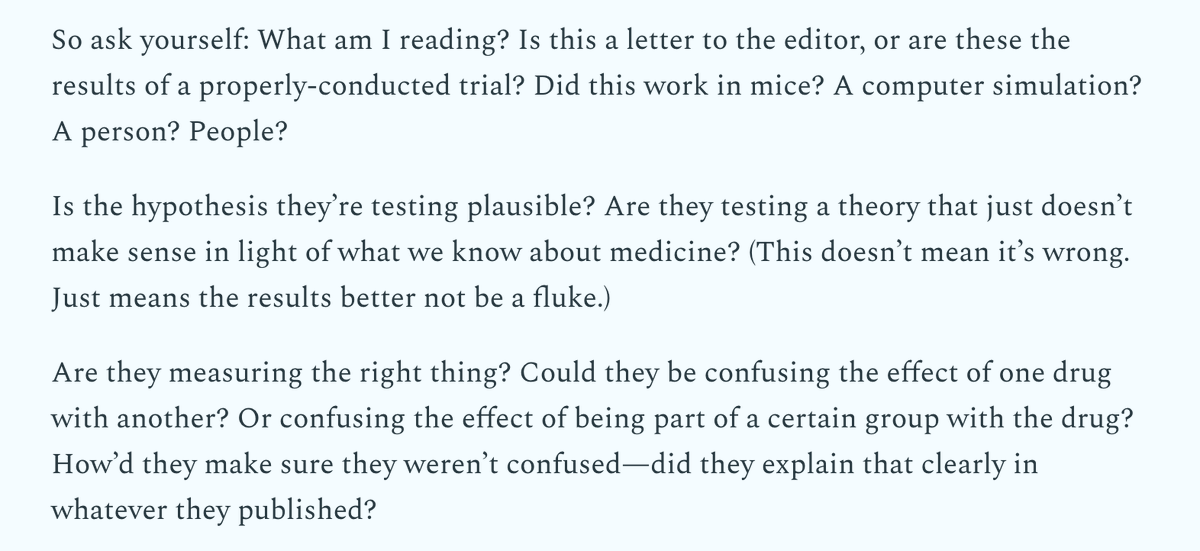
I suspect some people won't read an argument about vaccines and risk if it means reading a long essay, but might read it if I tweet it, sentence by sentence. I don't have the patience, but I'll repeat some of the arguments: claireberlinski.substack.com/p/epistemic-ch…
If you want to base your views of the safety and efficacy of mRNA vaccines or ivermectin on the most reliable information--not perfect, not infallible, but "best we've got right now"--"we" being humanity--here's a reasonable way to do it:
1. Get off social media, stop listening to YouTube and podcasts, and instead open Google Scholar. This gives you access to literature that's been published, at least, in the goal of increasing humanity's stock of justified, true beliefs.
Those who contribute aren't always successful in this goal; in fact quite often they fail, but the goal *exists.* Players tend to hit goals more often than random parts of the stadium, because they're aiming at that goal.
The design of social media means that goalpost--"justified, true belief" isn't even there, or part of the game. The goal is "selling advertising," so the whole system is structured differently.
So start on Google Scholar, so that at least you're playing the right game.
So start on Google Scholar, so that at least you're playing the right game.
2. You do not need to be an expert (sorry, @RadioFreeTom) to read and understand the results of a medical trial. Anyone who tells you this is exaggerating the difficulty of the concepts involved. The basic ideas are easy enough that they could be taught to 6th-graders;
and clearly, they *should* be, because far too many people don't know them, and their lives would be much easier if they did. You don't need a doctorate in quantum chemistry to grasp the basic principles *or* to read (and understand) the results of most trials of this nature.
People who tell you that you do are exaggerating the complexity of this. This might be because most people refuse to read this stuff, or will only read the one article that confirms ther hypothesis. This could lead you to conclude it must be very difficult for people.
It's not. It's just very time-consuming and often very boring. It will take you between three full work days and a week to read enough of the literature to really get a sense of all the trials that have been done and what they say.
Just reading the abstracts isn't good enough, because you have to read this stuff in a particular way. Here's what you do: enter a search term like "Covid19 vaccine safety and efficacy," or "ivermectin to treat Covid19." Commit to reading the first thirty pages of results.
You can't skip to the ones that seem to confirm your hypothesis. That's a methodological error. Just slog through it, one by one. Take notes. You're looking in particular for this: 

When you see terms you don't understand, don't skim. Grab the dictionary.
Use common sense. Assign a score to every study you read, from 1-5: If it's really persuasive and well done, give it a 5; if the sample is small, or the researchers don't explain how they did this study,
Use common sense. Assign a score to every study you read, from 1-5: If it's really persuasive and well done, give it a 5; if the sample is small, or the researchers don't explain how they did this study,

or if there's some other obvious methodological flaw, give it a 1; somewhere in between, give it the score you think it deserves based on the listed criteria.
When you're done, compare the quality and quantity of evidence for the hypothesis
When you're done, compare the quality and quantity of evidence for the hypothesis
that our vaccines are safe and effective against Covid19 against the quality and quantity of the evidence that ivermectin is safe and effective against Covid19.
There's no magic to it. No secret. No need put your faith in anyone's credentials.
There's no magic to it. No secret. No need put your faith in anyone's credentials.
It's not something you can do in five minutes, but if you read this far and can do a bit of basic math, it is definitely something you can do. The only obstacle is time. (And some journals are paywalled, but there are known solutions to that problem).
There's no magic, 280-character tweet or meme that can substitute for this, but there's not. You'll notice that these articles are often badly written, and this often conceals obvious mistakes in reasoning. You're not imagining that. Give those articles a low score.
Good luck. The truth is out there.
I meant, "I wish there were, but there's not."
(And if you want to read the rest of the essay now, it's here: claireberlinski.substack.com/p/epistemic-ch…)
• • •
Missing some Tweet in this thread? You can try to
force a refresh



